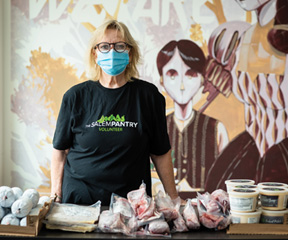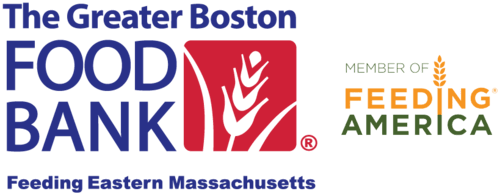Providing More Than Just Food to Meet the Need
Food insecurity in the greater Salem area is growing, says Robyn Burns, Executive Director of The Salem Pantry. “Before COVID, there was already a chronic unmet need,” she says. “When COVID hit, we saw a huge spike. In January 2020 we served 262 households, including 589 individuals. Today, we’re serving 1,250 families, about 3,000 individuals monthly.”

Most people who come to the pantry are low income and nearly 60% are Spanish speaking. “Thanks to grants from The Greater Boston Food Bank (GBFB), we were able to increase capacity by building out a storage warehouse with freezers and coolers to meet the growing demand,” Robyn says.
“We distribute food through our mobile market program and partnerships with other social service agencies,” Robyn says. “We work with Salem Public Schools and Salem State University, which is our biggest distribution point.” Salem State is part of the Hunger-Free Campus Coalition, led by GBFB, formed in 2019 to address food insecurity among high-need populations enrolled in Massachusetts public colleges and universities.
The Salem Pantry provides more than food. “In the early days of COVID, hospitals and health centers asked to set up with us to provide additional resources,” Robyn says. “We’re creating a community marketplace for our clients.”
The food distributed from The Salem Pantry comes largely from GBFB, local and regional farms, and community food donations. But Robyn says cash donations are critical.
“The food distributed from The Salem Pantry comes largely from GBFB, local and regional farms, and community food donations.”
“Donors who support us and GBFB are making a difference for individuals and families throughout Salem, the Greater North Shore, Boston, and beyond. Their support can be transformative for someone struggling with food insecurity.”
